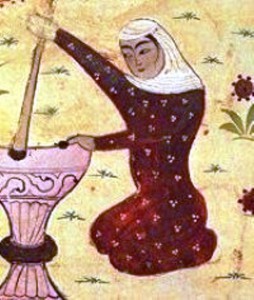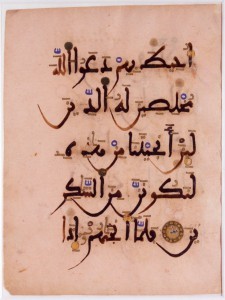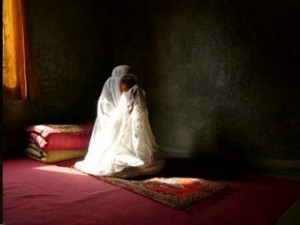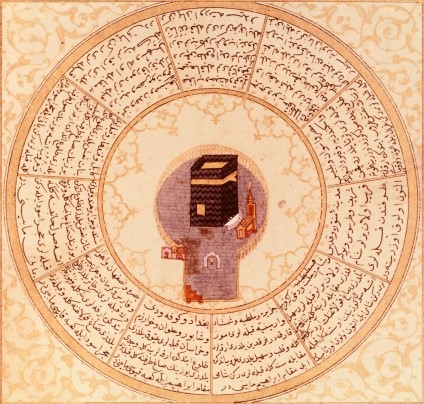Rabia al-Adawiya: Determined and Strong Muslim Saint
Rabia al-Adawiyya was such an important Muslim Saint
that so many legends were invented to confirm her absolutely pure spirituality,
and the respect of the community towards her reached a level never seen before.
If we consider the age she lived in, we notice how respected religious women
were at her time, compared to the situation many Muslim women must bear in the
West and also at home today.
public, and as soon as they show Islamic spirituality and strong belief, they
are called terrorists or terrorists‘ brides, or supporters of a misogynist
world view opposing to Western democracy and female self-determination. By
using Muslim women as example, the representatives of islamophobia try to
pursue their goal to discredit Islam as religion and culture. All positive
aspects of Islamic spirituality, Islamic values and morality, are completely
ignored. Women who are strong and strongly affirm their own ideas as part of
their Muslim identity are also criticized in their own community. They are
called disobedient women and rebels. The
self-determination we can recognize in Rabia’s life and spirituality which smoothed
her way to Divine Love are very rarely accepted as expression of Islamic
culture and life.
Badawi’s translation into English of the book entitled “Rabia al-Adawiyya:
Martyr of Divine Love” I will present in the present article can contribute to
deeply understand Rabia’s spiritual development, and to understand female
spiritual freedom in Islam. It helps to understand that authentic Islam is not misogynist.
This is one of the philosophical books about Islamic
mysticism that has touched me most in my life as a reader. That’s why I decided
to present it in English.

I believe the author is the Arabic philosopher of
existentialism tout-court. With this booklet, the Egyptian writer and
philosopher Abderrahman Badawi (1917-2002) makes an essential contribution to
interreligious dialogue, in particular with Christianity, offering many
comparative and dialogic approaches within mysticism and spiritual life in
Christianity and Islam, starting from a concept essential to Christianity, that
of Divine Love.
In his research, he compares the great Sufi Saint
Rabia al-Adawiyah and her psychological and theological-philosophical path
towards true Divine Love, as a completely dematerialised experience going
beyond religion as duty and law, with various important thinkers and mystic
pioneers of Christianity like Theresa of Avila, St. John of the Cross, or
notable Christian Saints like Saint Francis of Assisi and Saint Augustine of
Hippo.

A second aspect that makes this work fundamental for
Islamic interreligious studies is that Rabia al-Adawiyah was a woman. For
Islamic feminism, she represents an essential model of self-engagement,
braveness, and struggle for female spiritual growth.
Badawi’s work is noted for detailed historical and
philosophical research, a very critical evaluation of hagiographic sources, the
clear distinction between reality and legend, myth and history, and the
importance of spirituality and personal growth in faith.
Another important aspect is the concept of
dematerialisation of Islam, initiated by Rabia al-Adawiyah who influenced whole
centuries of Islamic philosophy and mystic thinking. For Badawi, the example of
going beyond the Kaaba and beyond the idea of hellfire and paradise to really
love Allah because of Himself only represents an incredibly developed concept
for that time.

There follows a short summary of all small chapters of
Badawi’s research with an indication of the most important concepts and
arguments he expressed.
In the introduction, the author speaks about Basra and
the soul of its inhabitants, showing how by dismissing legend it is impossible
to understand history, and, without history, it is impossible to understand the
development of spiritual life, which is considered as a process in time.
In chapter 1, Badawi presents the two main
difficulties in researching Rabia’s life: on one hand the scarcity of sources,
and on the other the confusing legends and invented stories to embellish her
theological achievements and spiritual development and perfectness.
The final objective of the author’s work is to
comprehensively show and describe the spiritual development of Rabia
al-Adawiyya, from her life of the earthly life through his conversion until her
perfection as martyr of Divine Love.
Unfortunately, we know very little about Rabia’s life.
Apparently she was born in a poor household, and became a slave who was then
freed. For a while, Rabia worked as a reed pipe player. Her conversion then
followed. Her personality changed completely, by emerging from the dark night
to the light of great souls like St. John of the Cross, St. Augustine and many
other Christian mystics.

In my opinion, Badawi’s approach to spiritual life as
a universal phenomenon can be very useful in promoting interreligious dialogue
between Christianity and Islam. The philosophical method of existentialist
philosophy can be very fruitful for the analysis of internal spiritual development
towards perfectness in Saints and mystics.
Another important aspect I consider very innovative in
this work by Badawi concerns the concept of Divine Love, another subject at the
crosslink of Christian and Islamic Theology. Badawi starts from the basic
assumption that Rabia was a Martyr of Divine Love, and that this Divine Love
was the achievement of spiritual de-materialised perfectness.
This idea is also shown very well in two discourses:
first, the subject about the Kaaba, which has to be controversially
de-materialised to achieve real spirituality. In this context, Islam goes
beyond Judaism and Christianity, which connect worship to a particular place,
while Islam de-materialises spiritual life completely on a topologic level.
Second, the concept of Paradise and Hellfire, which
are completely useless in achieving spiritual perfection. Indeed, Rabia affirms
that those who obey Allah because they fear hellfire are not true believers,
since those who really loves Allah only love Him for Himself, without looking
for any reward, and without being afraid of any punishment.

In the sixth chapter, Abderrahman Badawi introduces
the important biographical problems, with Rabia often confused with another
Rabia, even if for both there are many legends and embellishments to prove
their spiritual achievements and perfectness.
Another important matter Badawi focuses on is the
refusal of married life in Rabia’s sufi mysticism. She is convinced that
marriage would force her to strive for divine love according to Quran and
Sunnah. The same can be said about all worldly and material attachments and
links, even if they are linked to religion like the Kaaba and the belief in
paradise and hellfire. Rabia’s core principle is to love Allah for Himself
without any condition and reward. The Sufi notion of “camaraderie”, explained
in detail by the author, is affirmed by him as an early development of what
will become al-Hallaj’s concept of Divine Love in the future development of
non-orthodox Sufism.
According to the emotional concept of Love in Rabia’s
thought, there is an important distinction to be made between passionate love
on one hand, and true love on the other. Indeed, despite this qualitative
distinction, Rabia used them both, even if she always had in mind that Loving
Allah Himself for nothing but Himself is the highest level of Love of real
believers. In my view, the following passage I would like to mention in the
present foreword can be said to be the core message expressed by Badawi in his
work about Rabia al-Adawiyya:
“Then the final stage came by lowering the
curtains of her divine love tragedy by the scene of those angels, i.e. the
women who took her to her final resting place in heaven, like Gretchen in ‘Faust
II’. However, she was not elevated to the high rank by eternal “womanly” (Das
Ewig-Weibliche), but by the martyr-dom of divine love. Anyway, who knows!
Eternal femininity and divine love may be the same!”

I would say that without excluding the possibility
that Eternal femininity and Divine Love could perhaps coincide, Badawi exalts
women’s contribution to Islam not only in the area of mysticism, but in general
Islamic thought and religious culture. Moreover, this is the heritage by Rabia
we have to strongly reaffirm today.
of the extensive legends invented about her life and
deeds also prove her essential importance in Islamic doctrinal development.
Another important aspect inherent in Divine Love
according to Rabia’s world vision is the duality between passivity and
activity. Detaching herself from passionate love to reach the real love of
loving Allah for Himself only was not the last passage she wanted to achieve,
as she additionally strived for active love as product of the passive
experience of Divine Love she had already experienced.

As concerns the explanation of this active love made
of hardship and struggles, Badawi compares Rabia’s experience with the dark
night of Juan de la Cruz, offering us another important thought-provoking
impulse for interreligious dialogue between Christianity and Islam.
In the next chapter, Badawi makes an important
topological distinction between the three monotheistic religions, focussing on
the fact that Islam does not “limit worship to one place, because every place
could be made a house for worshipping Allah.” The thesis the author affirms is
that Rabia revolutionarily transformed Islamic thought by her criticism of the
sensual and material aspects of religion as we have already seen in her
discourse on the Kaaba. Another important element Rabia introduced into Islamic
spirituality was the call for pain, an essential element of the path to Divine
Love. True worship is worship devoted to Allah without seeking rewards or
benefits; it is not because of some religious text or fear; and it is not
because of awakening of desire or fear. It is not because of Paradise or
hellfire. This is the central message of Rabia’s Sufi spiritual conception.


